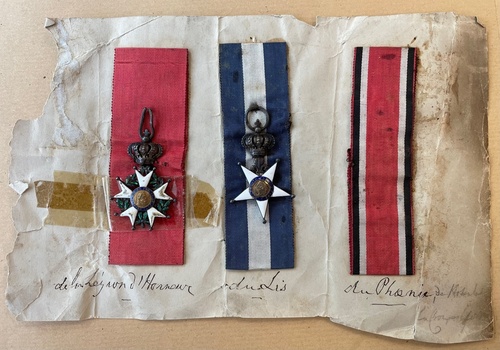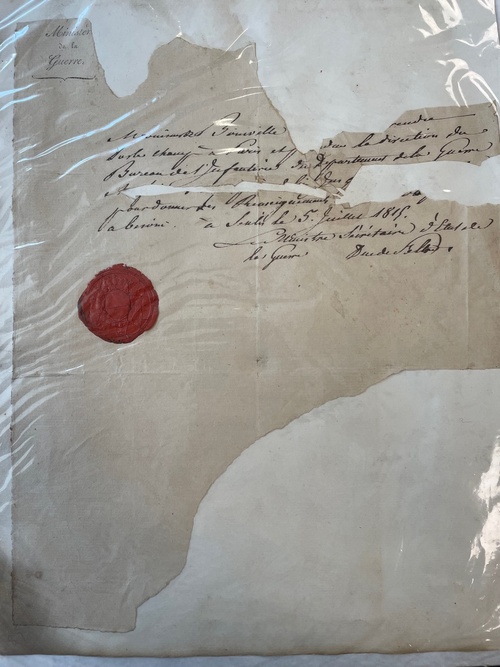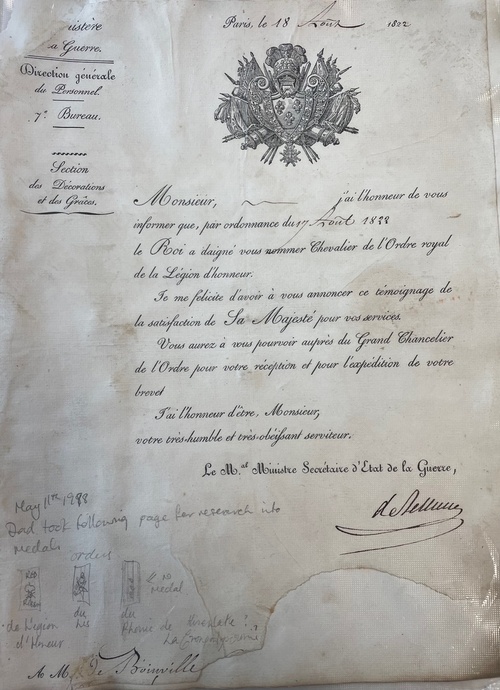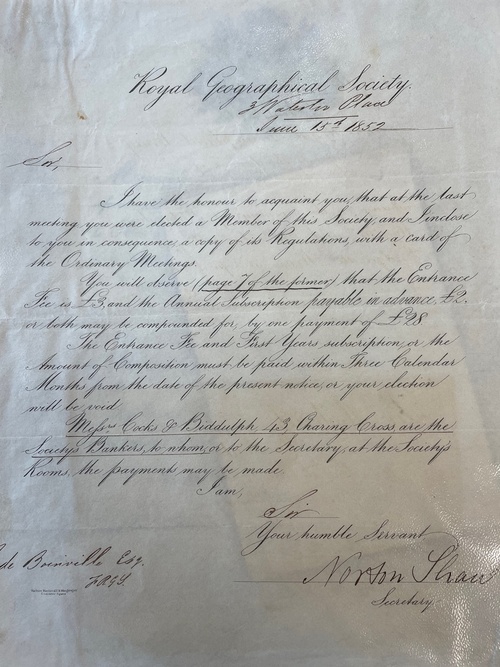Auction: 22002 - Orders, Decorations and Medals
Lot: 266
The Legion of Honour and Order of Fidelity pair awarded to Chevalier Alexander de Boinville, who was also the recipient of the Hohenlohe, House Order of the Phoenix
France, Legion of Honour, silver, gold centres and enamel, 35mm; Order of Fidelity, 32mm, silver, gold centres and enamel; Germany, Hohenlohe, House Order of the Phoenix, riband of the Order, these three items mounted on an old piece of card with ink inscriptions in French, rather worn, nearly very fine (3)
The group and archive are the basis of an article published by Owain Raw-Rees in the June 2022 O.M.R.S. Journal, a copy of which is included.
Alexandre de Boinville was born in Paris circa 1785 and with relatives fled France to England. Sometime after Napoleon took power de Boinville became involved with the military, sharing in a duel in Bilboa - and government circles - being appointed Head of the Bureau of Infantry in 1815 - a position he held until 1828, and received the Order of the Phoenix and the Decoration of the Lily. He was made a Knight of the Legion of Honour in 1822. In May 1834, still with Ministry of War in Paris, he writes an eulogy for Lafayette. The next year, still in Paris, he receives letters from an old colleague Augustus, Losack of the British Auxiliary. He settled in London and is married in 1850. In 1852 he was elected to the Royal Geographical Society having been a member of the Geographical Society of Paris. Subsequently he lives in London, St. Helier and Maidstone. He returns to Kensington in London where he dies in 1865, aged 81, being buried in a common grave in Brompton Cemetery.
Sold together with the following archive of letters:
(i)
A letter which states:
Ministere de la Guerre Monsieur de Boinville […] rentre sur le champs à Paris et [prenne?] la direction du Bureau de l'Infanterie du Departement de la Guerre et […] donner des Renseignements […] a besoin. A Senlis le 5 juillet 1815. Le Ministre Secretaire d'Etat de la Guerre. Duc de Feltre
Translation: Ministry of War Monsieur de Boinville […] go back to Paris immediately and [take] the direction of the Infantry Office of the War Department and […] provide information (intelligence?)[…] [he?] needs. At Senlis on July 5th, 1815. The Minister Secretary of State for War. Duc de Feltre.
After Napoleon's second abdication, Feltre was again re-appointed Minister of War and served in that capacity until 1817. He was made a Marshal of France in 1816. The Battle of Waterloo was on 18 June 1815 thus this letter, which appears to appoint him Director of the Infantry Office, written just over two weeks after Napoleon's defeat, indicates De Boinville's close involvement in the political turmoil after the Battle.
(ii)
A letter advising de Boinville of his appointment as a Knight of the Legion of Honour. A translation of the letter from the Ministry of War, Director General of Personnel, 7 th Bureau, Decorations and Favours - dated 18 August 1822 states:
'Sir, I have the honour to inform you that by order of 17 August the King has deigned to appoint you a Knight of the Royal Order of the Legion of Honour. I am very pleased that I shall announce this testimony of the King's satisfaction with your services. You will have to check with the Grand Chancellor of the Order for your reception and for the expediting of your certificate. I have the honour to be Sir, your most humble and most obedient servant, The Marshall, the Minster Secretary of State for War. De Bellune.'
(iii)
A letter from the Royal Geographical Society in London, dated 15 June 1852, advising de Boinville of his election as a member of the Society.
the RGS Archives (RGS/CB4/196-Boinville, The Chevalier A. de) I obtained copies of correspondence with Alexander de Boinville which concern payment of subscriptions and lack of attendance due to ill health. In the letter of 26 November de Boinville notes, 'I believe you print a list of the Members of your Society. May I request to be inscribed thus Cher. De Boinville, KLH, KPH.'
Further correspondence with the Royal Geographical Society supplied the following information concerning de Boinville's election as a Fellow of the Society. De Boinville is noted as a, 'Member of Geographical Society of Paris, residing at No.3 Chester Terrace, Chester Square. Recommended by: Capt. W.H. Smyth R.N. - having personal knowledge of candidate; John Hogg; John Lee. Elected: June 14th 1852 - Removed: 7.5.1866.'
In 1815 and 1816, Irish Officers of the Irish Legion who fought for Napoleon and their future suitability for recall. Such cases, '…came before the Commission d'Examin, charged with checking the suitability of officers who had applied for recall, and officers with Napoleonic or Republican sympathies were not to be reemployed.'
Anyone deemed a fanatical Bonapartist was deported. The decisions were signed by, 'Boinville Defresne, Head of the Bureau of Infantry at the Ministry for War and President of the Commission.' It is further noted that, '…the decision of the Commission d'Examin, established by Minister for War, Henri Clarke, Duke of Feltre, to examine the suitability of every army officer who applied for recall to active service. The signature is that of Alexandre Boinville Defresne (sometimes de Fresne), who presided.' A footnotes state that Alexandre de Boinville Defresne (sometimes de Fresne) was born in 1785 and became Head of the Bureau of Infantry in 1815.
In 1969 a bundle of letters was found in a house on the outskirts of St. Helier - where de Boinville is noted as living in 1852. Amongst these letters were a number written by Augustus Losack, an officer of the British Auxiliary Legion, to Alexandre de Boinville at the Ministere de la Guerre, Paris.
In a letter of 19 September 1835, from Augustus Losack to Monsiuer de Boinville, Rue de Clichy, No. 74, Paris:
'Who would have thought my dear Boinville that after so many degradations and disasters I should have again resumed the sword I never should have quitted. - I often though of you. I had often heard you say how you would like to pass the residue of your eventful life in the quiet bosom of some Devonshire vale, with a wife - soft idea! - and your smiling family around you and write on your door, "Inveni Portum, etc, etc. (I've found my haven)."
Another dated 26 May, 1836 states:
'We remained three months in England and then joined the army at Bilboa. When recruiting in England I was stationed in Exeter, a place I have often heard you mention as the scene of some happy days in your youth. I have also heard you mention Bilboa where you fought a duel.'
Subject to 20% VAT on Buyer’s Premium. For more information please view Terms and Conditions for Buyers.
Sold for
£750
Starting price
£240











